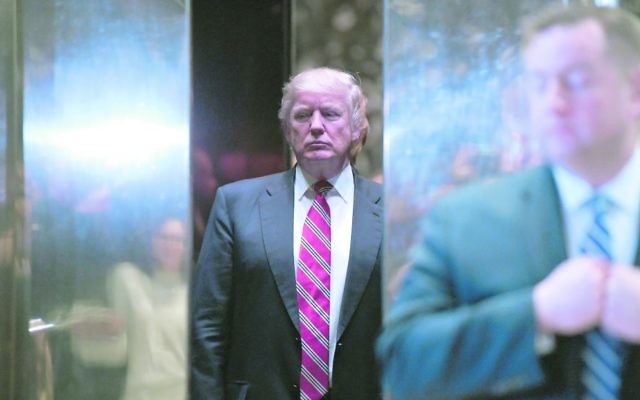A tale of two Trumps
ISRAELIS have never before been faced with such conflicting predictions about who will be sitting in the Oval Office.

ISRAELIS have never before been faced with such conflicting predictions about who will be sitting in the Oval Office.
Broadly speaking, they are picking the one that matches their political leanings, with the right-wing among the public happy to see the back of Barack Obama and feeling optimistic, while more centre and left-oriented Israelis cover a spectrum from reticence to concern. But among decision-makers and diplomats, there’s a strong sense that it’s just not so simple.
“The Israeli government officials are perplexed,” said Robbie Sabel, who served for decades as a senior diplomat and headed the legal department at Israel’s Foreign Ministry. “They’re delighted that Trump has come out in favour of Israeli policy and for moving the US embassy to Jerusalem. But there’s a worry about how consistent he’ll be – he’s an unknown quantity.”
Sabel, a professor of international relations at Hebrew University, said that until now the Israeli establishment has always had a good sense of new presidents before inauguration, commenting: “We’re used to working with people we’ve known through Congress for years.” He noted that government officials are also unsettled by the fact that Trump’s supporters included anti-Semites, and the fact that he sometimes appears to want to tone down international alliances.
In the general population, the polarising views of both the optimists and the pessimists have been strengthened in recent days and weeks.
Settler leaders delightedly packed their bags and headed to Washington for the inauguration, after Trump took the unprecedented step of sending invitations to their main lobby group, the Yesha Council. After the recent UN resolution against Israeli settlement policy, Trump suggested that he will ensure this kind of thing doesn’t happen when he is in office and said that Israeli needs to “stay strong” until his inauguration.
What’s more, earlier this month, Trump ally Mike Huckabee visited Jerusalem and declared that “there’s no such thing” as either a “settlement” or the “occupation”, supporting the settler argument that West Bank communities have all the legitimacy of those in Israel.
For the pessimists, the sensational though unverified claims that Russia has information on Trump, including about a supposed evening with prostitutes in Moscow, which could be used to blackmail him, are fuelling fears.
Even before the claims, some Israelis were questioning what the Trump administration will mean for their security. Now, their questions don’t only focus on fears that Trump could act impulsively on Syria or change policy towards Iran without considering all consequences, but also that Russian power over him could cause him to pass sensitive information to the Russians – which could in turn make its way to the Iranians.
American intelligence officials told Israeli counterparts that with Russian President Vladimir Putin enjoying “leverages of pressure” over Trump, secrets shared with the US could be at risk, according to Israeli media reports. The Americans in question reportedly said that Jerusalem should be careful what information it tells Washington.
Chuck Freilich, former deputy national security adviser of Israel, thinks that the optimists and the pessimists are reaching premature conclusions.
He told The AJN that there “might be some cases that a specific piece of sensitive information – if something got to Russia it could get to Iran, sure”. However, Freilich said that the chance of Israel seriously limiting what it shares with Washington is “not very great”. As for the prospect of Russian blackmail, he believes that this is too theoretical to consider now, and noted that it could cause a crisis far beyond Israel. If blackmail did occur, Freilich said that it “could compromise information from the entire US intelligence establishment and everyone who cooperates with it”.
Freilich, a researcher at Harvard University and at Herzliya’s Interdisciplinary Centre, thinks that concerns about Trump and the Syrian civil war are sometimes overplayed. Israelis often voice a fear that Trump could indirectly bolster Iranian power in Syria, by becoming closer to the Kremlin and backing Russia. The worry stems from the fact that Russia is supporting the Syrian-Iranian side of the conflict.
Freilich believes that Trump may be able to back Russia in Syria without strengthening Iran – and even manage to weaken Iranian power. He suggests allowing Russia to further entrench itself in Syria on condition that Tehran’s power there is restricted. “We have an interest in seeing Russia continue to play a role in Syria if they can restrict Iranian influence,” he said.
The Israeli right may, according to Freilich’s analysis, be advised to put the champagne on ice, and the left wing may want to hold off eulogising the peace process. People should not expect Trump’s campaign talk to set expectations for his presidency, or anticipate big policy decisions being left to his ambassador to Israel, settlement patron David Friedman. “There is more room for friction than people on the right in Israel are hoping,” Freilich said. Doubt is already being cast on campaign trail talk of moving the US embassy to Jerusalem, after Trump’s pick to lead the Pentagon, James Mattis, said that he regards Tel Aviv and not Jerusalem as Israel’s capital.
Freilich said that with Trump’s direct style, he could end up disappointing the right and the government, laying down the law with them if his plans for the Middle East don’t match with theirs. In such a scenario, he could “come down on Israel in a way that no previous administration has”.
NATHAN JEFFAY

comments